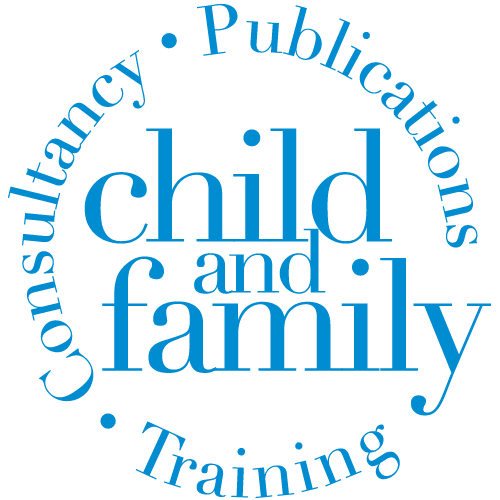Hope for Children and Families Programme
Child and Family Training (C&FT) is a not-for-profit organisation that aims to help professionals help children and families by:
- promoting children's and young people's health and development
- building on children, young people and families' strengths
- helping children, young people and families overcome difficulties
- using evidence-based approaches.
These four principles underpin its practice resources (the Hope for Children and Families tools, instruments and practitioner guides), training courses, consultation and development work.
View a short video introduction (1) to the work of C&FT.
The Seven-Stage model
A Seven-Stage model of assessment, analysis, planning and reviewing interventions in child well-being and safeguarding contexts sets out the processes C&FT uses in its work with children and families: from assessment and analysis to decision-making; from planning to intervention; from review to evaluating effectiveness. This approach is relevant to all children's social care, health, education, youth justice and related disciplines, organisations and services.
- Stage 1: Consider the referral and the aims of the assessment
- Stage 2: Gather assessment information on the child's developmental needs, parenting capacity, and family and environmental factors
- Stage 3: Establish the nature and level of impairment of the child's health and development
- Stage 4: Analyse the patterns of strengths and difficulties
- Stage 5: Decision making: The systemic analysis
- Stage 6: Develop and implement a plan of intervention
- Stage 7: Identify outcomes and measures for assessing change, and review outcomes
Strengths and evidence-based
The Hope for Children and Families strengths and evidence-based practice tools and resources include:

A. Communicating and working directly with children, young people and others using 'Apps':
- In My Shoes
- This Feeling
- This Much
- Backdrop
B. Assessment and analysis, developing plans and measuring outcomes:

- Assessing parenting and the family life of children using the HOME Inventory and the Family Pack of Questionnaires and Scales
- Assessing families in complex child care cases using the Family Assessment
- Using the Attachment Style Interview to assess parents and carers' attachment style
- Child Protection Decision Making using the Safeguarding Children Assessment and Analysis Framework
C. Intervention resources: each intervention guide includes briefing papers for practitioners, modules relating to the theme of the intervention guide and additional materials to support the practitioner's work with children and families:

- Introduction and overview
- Engagement and goal setting (including the case-specific information record)
- Modifying abusive and neglectful parenting
- Promoting children and young people's health, development and wellbeing
- Promoting attachment, attuned responsiveness and positive emotional relationships
- Promoting positive parenting
- Working with children and young people: Addressing emotional and traumatic responses
- Working with children and young people: Addressing disruptive behaviour
- Working with families
- Working with child sexual abuse
Additional resources:
- Brief descriptions of the intervention guides
- Therapeutic interventions after abuse and neglect
- Therapeutic interventions for anxiety, depression, trauma and disruptive behaviour
- Therapeutic interventions for looked after children, young people and their caregivers
Training and development
All Training and development incorporates:
- knowledge (practice wisdom and up-to-date research);
- skills (core skills of observation, listening, interviewing, recording, gathering information, analysing, reporting, decision- making, planning, intervention, review and evaluation); and
- values and related skills (working with all children and young people, parents and carers, family members and other professionals – recognising and valuing diversity and difference).
C&FT's delivery models of training and development include:
- formal training days: of standard and of bespoke courses and programmes of training
- coaching / reflective practice / support
- developing sustainable training capacity within an organisation through agency-based training the trainer programmes, accreditation and support
- working with practice supervisors and managers responsible for practice, operational and service management.

Feedback from course participants using these approaches:
- Evidence based, motivating and confidence building
- It gives young people a stronger voice and they enjoy using the tools
- Staff enjoy the tools, and value the framework it offers
- Brings meaning to their work and leads to more effective outcomes
- Generates confidence in theor own skills
Hope for Children and Families
The Hope for Children and Families evidence-based practice resources, training courses, training materials, consultation and development work:
- can deliver the knowledge, skills and values required for effective practice by confident and competent practitioners and organisations working with children and families in social care, health, education, youth justice and other organisations – including multi- professional services
- are relevant for practice within and across a broad spectrum of roles: generic and specialist
- can be used by professionals working across the full range of levels of children and young people's needs and the related duties and responsibilities: from early help to work with children in need and their families; from child protection to work with children and young people on the edge of care or who are looked after or adopted
- can help promote 'whole system' change in individual practitioners, teams or organisations
-
links directly to:
- professional standards for health, education and social care practitioners such as the Department for Education's Knowledge and Skills Statements for Accredited Child and Family Practitioners; the Health and Care Professions Council's Standards of Proficiency and the Professional Capabilities Framework for Social Workers (other statements of professional standards and requirements can be cross-referenced as required);
- requirements set out in statutory guidance such as: Working Together (2015), Court orders and pre-proceedings (2014), the Public Law Outline (2014) and the Children Act 1989 guidance and regulations Vol 2: care planning, placement and case review (2015).
Download Introduction to Child and Family Training’s Hope for Children and Families Programme flyer.
